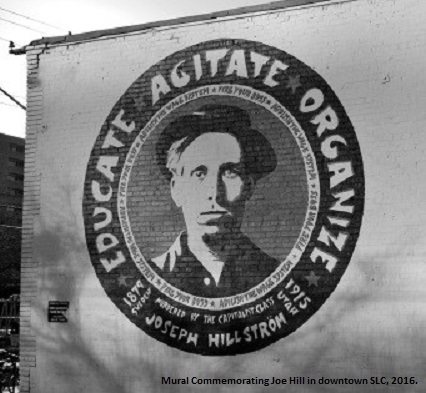Dublin Core
Title
Description
Joe Hill has become a deeply ingrained part of Utah folklore. The Wobbly songwriter was executed for murder in the state in the early 1900s.
At the turn of the twentieth century, the labor movement in the United States was on the ascendance as workers fought for better treatment in the workplace. The Industrial Workers of the World, commonly known as Wobblies, were a group that broke from the AFL and began attracting rank and file workers across the U.S., including in Utah. One of the IWW’s unique methods for creating unity among its members and for recruiting new members was the use of song. Perhaps the union’s most important songwriter was Joe Hill, an itinerant worker and poet who had been born in Sweden.
Hill arrived in Utah late in 1913 and immediately went to work at a mine in Park City. After losing his job because of illness, he became a frequent guest in Swedish immigrants’ homes in Sandy and elsewhere, being popular because of his ability to play the piano and sing Swedish songs.
But on the night of January 10, 1914, a grocery store owner, John G. Morrison, and his son Arling were murdered by two men with bandannas over their faces. Several men, including Joe Hill, were suspected of the murder. Hill was in the suspect group because he had been treated for a gunshot wound the same night. In the end, he became the only suspect in spite of incriminating evidence found on another man.
Hill’s trial was often more about his involvement with the labor union than about the murders. He was convicted on circumstantial evidence, and the judge suppressed several circumstantial facts that could have helped Hill. The trial became a national cause célèbre, and after Hill’s conviction and sentencing to death, hundreds of people across the country, including President Woodrow Wilson, wrote letters asking for a pardon, a new trial, or commutation of the sentence to life in prison. Nevertheless, the Utah authorities executed Hill by firing squad on November 19, 1915, turning him into a martyr of the labor movement whose songs are still popular today, and about whom songs have been written.
Creator
Source
Image: Labor activists have touched the lives of many workers, and have occasionally become an important part of local culture. Mural commemorating legacy of Joe Hill, downtown Salt Lake City, 2016.
_______________
See Gibbs M. Smith, Joe Hill (Salt Lake City: University of Utah Press, 1969).

